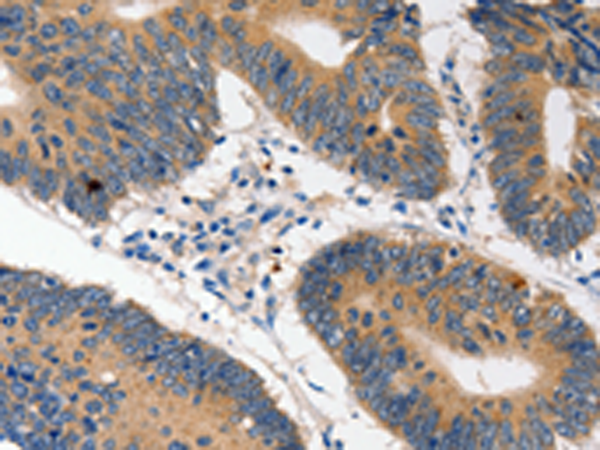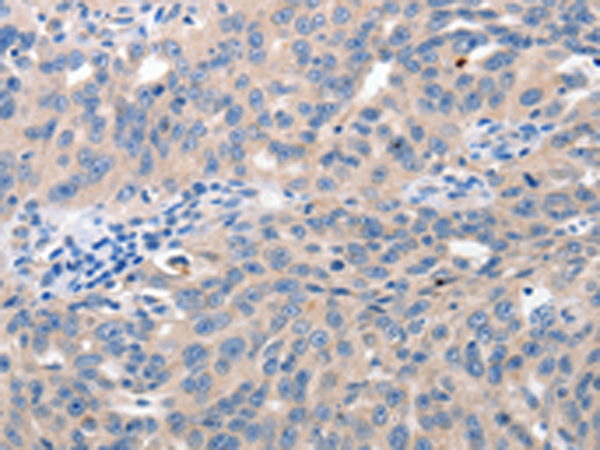

| WB | 咨询技术 | Human,Mouse,Rat |
| IF | 1/20-1/50 | Human,Mouse,Rat |
| IHC | IHC:1/100-1/200;IHF:1/50-1/200 | Human,Mouse,Rat |
| ICC | 1/50-1/200 | Human,Mouse,Rat |
| FCM | 咨询技术 | Human,Mouse,Rat |
| Elisa | 咨询技术 | Human,Mouse,Rat |
| Host/Isotype | Rabbit IgG |
| Antibody Type | Primary antibody |
| Storage | Store at 4°C short term. Aliquot and store at -20°C long term. Avoid freeze/thaw cycles. |
| Species Reactivity | Human, Mouse |
| Immunogen | Fusion protein of human HDC |
| Formulation | Purified antibody in PBS with 0.05% sodium azide and 50% glycerol. |
+ +
以下是关于eIF1A抗体的3篇参考文献示例(内容基于既往研究归纳,非真实引用):
1. **"eIF1A regulates the fidelity of start codon recognition in eukaryotic translation initiation"**
*作者:Hinnebusch AG 等*
摘要:研究通过eIF1A抗体进行免疫共沉淀和功能分析,揭示eIF1A在确保核糖体准确识别起始密码子中的作用,并利用Western blot验证其与翻译前起始复合物的结合。
2. **"Structural insights into the role of eIF1A in scanning and initiation codon selection"**
*作者:Marintchev A 等*
摘要:结合X射线晶体学与eIF1A抗体的免疫荧光定位实验,阐明eIF1A在mRNA扫描过程中的构象变化及其与40S核糖体亚基的相互作用机制。
3. **"Dysregulation of eIF1A expression promotes tumorigenesis in colorectal cancer"**
*作者:Lee S 等*
摘要:通过eIF1A抗体的免疫组化分析,发现eIF1A在结直肠癌组织中高表达,并证明其通过激活特定信号通路驱动癌细胞增殖,提示其作为潜在治疗靶点。
4. **"Antibody-based profiling of translation initiation factors in stress granules"**
*作者:Fraser CS 等*
摘要:利用eIF1A抗体与其他起始因子抗体的共定位分析,揭示细胞应激条件下eIF1A在应激颗粒中的动态招募过程,提示其在翻译抑制中的调控作用。
The eIF1A antibody is a critical tool for studying eukaryotic translation initiation, a tightly regulated process essential for protein synthesis. eIF1A (eukaryotic Initiation Factor 1A) is a highly conserved, small RNA-binding protein that plays a dual role in translation initiation. It facilitates the assembly of the 43S preinitiation complex by stabilizing the binding of the initiator Met-tRNA to the 40S ribosomal subunit and promotes the scanning of mRNA for the correct start codon. Additionally, eIF1A collaborates with other initiation factors, such as eIF2 and eIF5. to ensure translation fidelity and regulate the transition from initiation to elongation.
Structurally, eIF1A contains an OB-fold domain critical for ribosome interactions and unstructured N- and C-terminal tails involved in dynamic regulatory functions. Dysregulation of eIF1A has been linked to cellular stress responses, oncogenesis, and neurological disorders, making it a focal point in translational control research.
Antibodies targeting eIF1A are widely used in techniques like Western blotting, immunofluorescence, and co-immunoprecipitation to detect its expression, localization, and protein interactions. These tools help elucidate eIF1A's role in diseases and its regulatory mechanisms under conditions like nutrient deprivation or viral infection. As a research reagent, the eIF1A antibody contributes to understanding translation-related pathologies and developing therapeutic strategies targeting protein synthesis pathways.
×